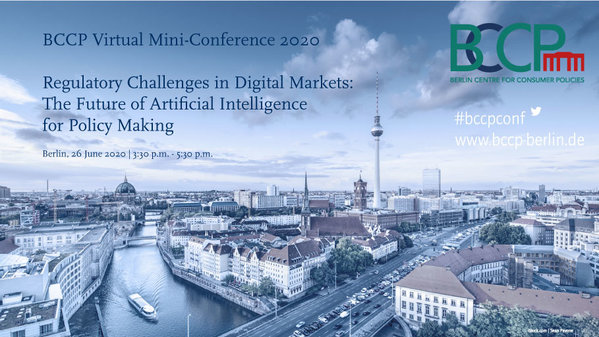BCCP Virtual Mini-Conference 2020
Focusing on regulatory challenges in digital markets, in particular the future of artificial intelligence (AI) for policy making, the fifth annual Conference and Policy Forum of the Berlin Centre for Consumer Policies (BCCP) was held on June 26th, 2020. This year, the conference took place as a virtual mini-conference.
Touching upon an issue at the forefront of current European and US policy debates, around 100 participants, including academics from law and economics, policy makers, professionals, BCCP Fellows, and the interested public joined the webinar.
Conference review
During the two-hour conference, Daniel Björkegren (Brown University), Joanna Bryson (Hertie School of Governance), Anna Christmann (Member of the German Bundestag and the German Parliamentary Study Commission on Artificial Intelligence, Bündnis 90/Die Grünen), and Cass Sunstein (Harvard University) discussed various issues ranging from the regulation of AI to fostering AI in Europe to the potential benefits and dangers of using AI in the public domain. Anna Christmann called for European politics to fund science in order to enable AI made in Europe. Further, she discussed the need for legal rules to reap the benefits of AI while avoiding its risks. Daniel Björkegren added that we are only seeing the early days of AI. He explained how AI would come in three phases: First, automating tasks that humans are currently doing, second, making decisions in areas where it was not cost-efficient to have humans decide (for example, content moderation online), and third, detecting nuanced behavioural patterns and encouraging those that are desired. Joanna Bryson argued that AI should be treated as any other human-made product. In particular, corporations ought to be held accountable if anything goes wrong with their technology. Further, the economic and social impact of AI needs to be acknowledged and considered in policy making. Cass Sunstein finished the round of opening remarks with a positive outlook: He suggested that properly regulated and designed, AI can be a powerful instrument to protect human rights by reducing bias and, more importantly, noise in human decision-making. Finally, he called for a bill of rights for the use of AI. In the subsequent discussion, moderated by Hannes Ullrich (DIW Berlin and University of Copenhagen), the panellists stressed the need to be specific when discussing regulation of AI. Potential use cases are broad and heterogenous, requiring continued discussions on how to design effective regulation. Spurred by questions from the audience, the discussion also covered ideas to improve humans’ trust in AI, the role of Europe in AI development and governance, and the question of accountability for AI errors.
Watch the recording of the entire conference here:

Further information about the conference and the speakers can be found at the conference website.

